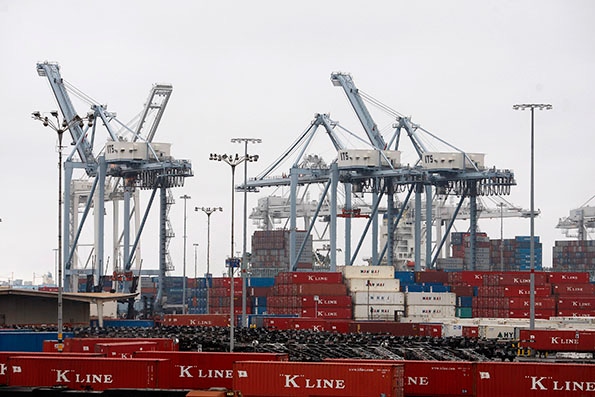Pork Exporters Need Breakthrough in West Coast Port Labor Negotiations
December 15, 2014

U.S. pork exports are on pace to set a new value record in 2014, with the final total expected to be about $6.6 billion – a 10% increase over last year. This will be achieved despite some significant headwinds, including a strengthening U.S. dollar and a large influx of European pork into key Asian markets – a result of the pork trade impasse between the European Union and Russia, which is now in its 11th month.
The U.S. pork industry is now dealing with an additional challenge – congestion in our West Coast ports. The six-year labor contract between the Pacific Maritime Association (PMA) and the International Longshore and Warehouse Union (ILWU) expired July 1, so West Coast longshoremen have worked without a contract for nearly six months. Negotiations on a new contract agreement began in May, and appeared to be progressing over the summer. In August, the PMA and ILWU issued a joint statement announcing that they had reached agreement on health care benefits, which were expected to be among the more difficult issues tackled in the contract negotiations.
Industries that rely on smooth port operations took the health care benefits announcement as a positive sign. Both sides pledged to keep the ports operating until a new contract was reached, and the negotiations seemed cordial and calm. This began to change in October, when congestion at some ports hit unusually high levels. On Nov. 3, the PMA issued a media statement accusing the ILWU of orchestrating slowdowns in productivity in an attempt to influence the contract negotiations. The ILWU denied the allegations, and since that time a more contentious tone has characterized the negotiations.
The U.S. Meat Export Federation (USMEF) recently joined a broad coalition of agricultural industry associations in urging the White House to use all means at its disposal to help bring the PMA-ILWU contract negotiations to a conclusion, including assignment of a federal mediator. So far no such action has been taken.
“It is extremely important to our members that a new contract agreement is reached soon,” says USMEF President and CEO Philip Seng. “Congestion and delays hurt the industries that rely on these ports to export their products. And if these industries are not successful, there will be no winners – everyone is going to share the pain.”
Including muscle cuts and variety meat, the U.S. pork industry exports 27% of its total production. About 40% of the volume (37% in value terms) is shipped to Mexico and Canada using ground transportation. But the remainder relies on ocean freight, and 76% of U.S. waterborne pork exports exit the country through West Coast ports. Ports on the East Coast and Gulf Coast are not under the PMA-ILWU contract, but re-routing exports through those ports – especially to Asian destinations – can be costly and problematic.
“With frozen product, any additional time in storage or transport is going to add cost,” Seng explains. “But we also ship a significant volume of chilled pork overseas, especially to Japan and South Korea. For chilled product, the situation is even more troubling because you have shelf-life concerns on top of the added costs. And given the current competitive landscape in Asia, passing these additional costs along to customers is not an option.”
Seng notes that the situation also creates undue tension for international buyers.
“Meat importers have customers to serve, and they need reliable suppliers,” he says. “U.S. pork has a very loyal customer base in the overseas markets, but this is a fiercely competitive business. Anything that has the potential to disrupt our shipments can cause buyers to seek alternatives.”
The week ahead could be the most critical since the contract negotiations began. The ILWU has scheduled a coast-wide caucus for Dec. 15, at which point the union’s leadership is expected to decide whether to bring the contract terms negotiated to date to a vote of its full membership, or return to the negotiating table with the PMA. The U.S. pork industry will be watching these developments carefully, hoping for positive momentum toward a new labor contract. There is a lot at stake for the U.S. economy, including the continued success of U.S. pork exports.
You May Also Like



